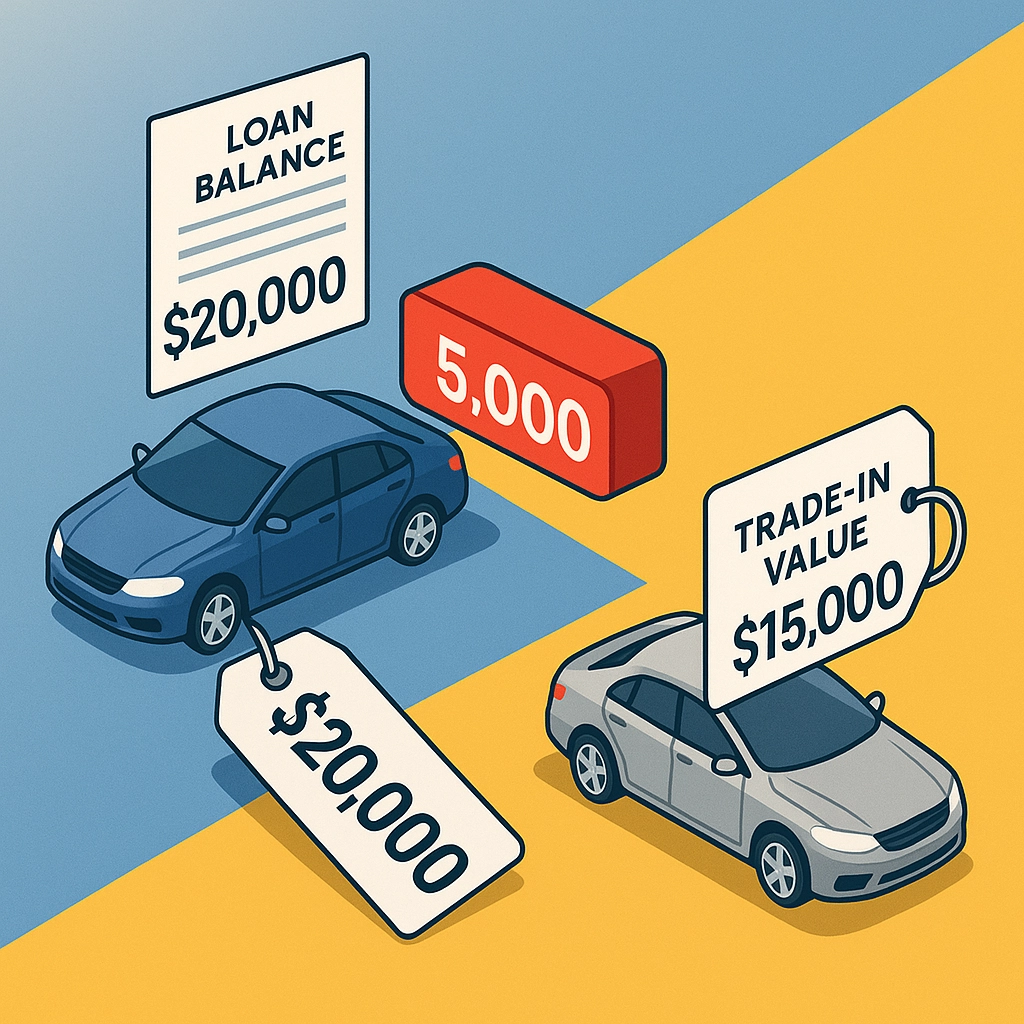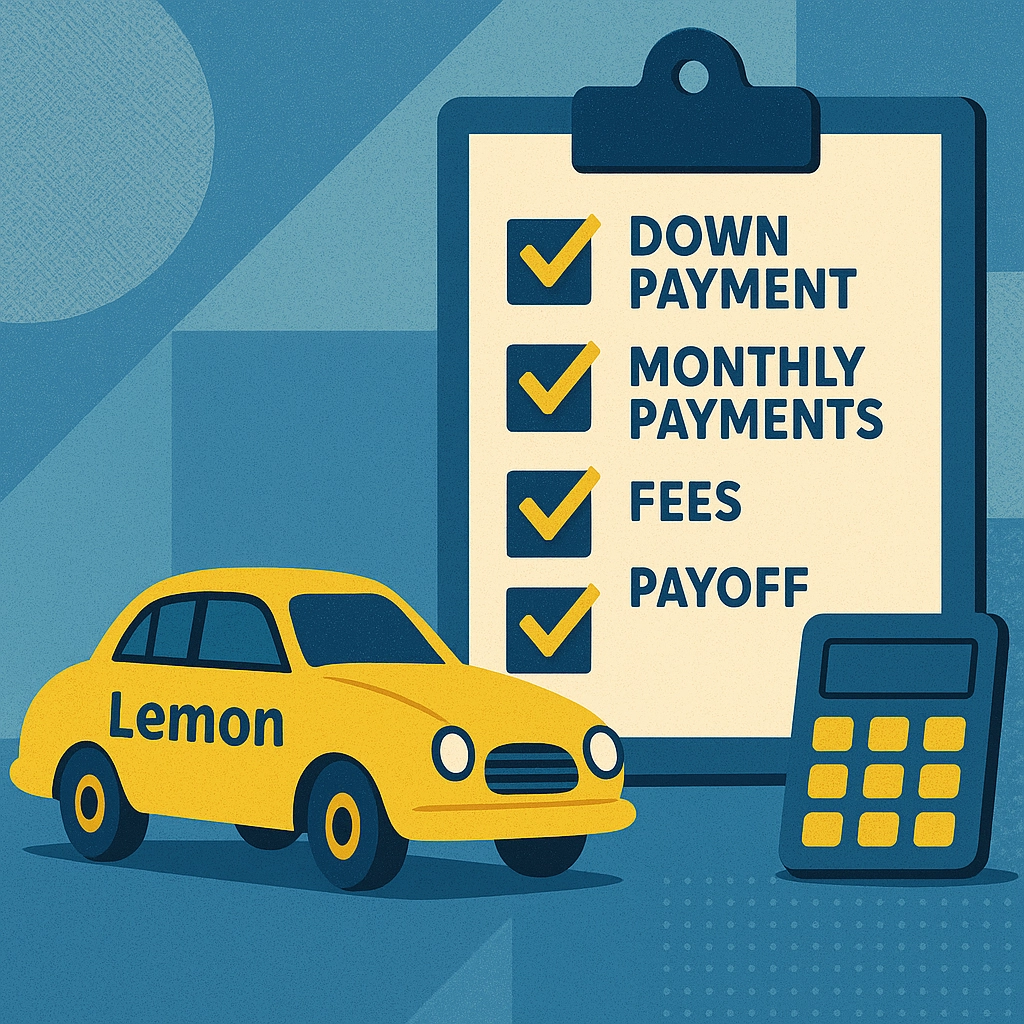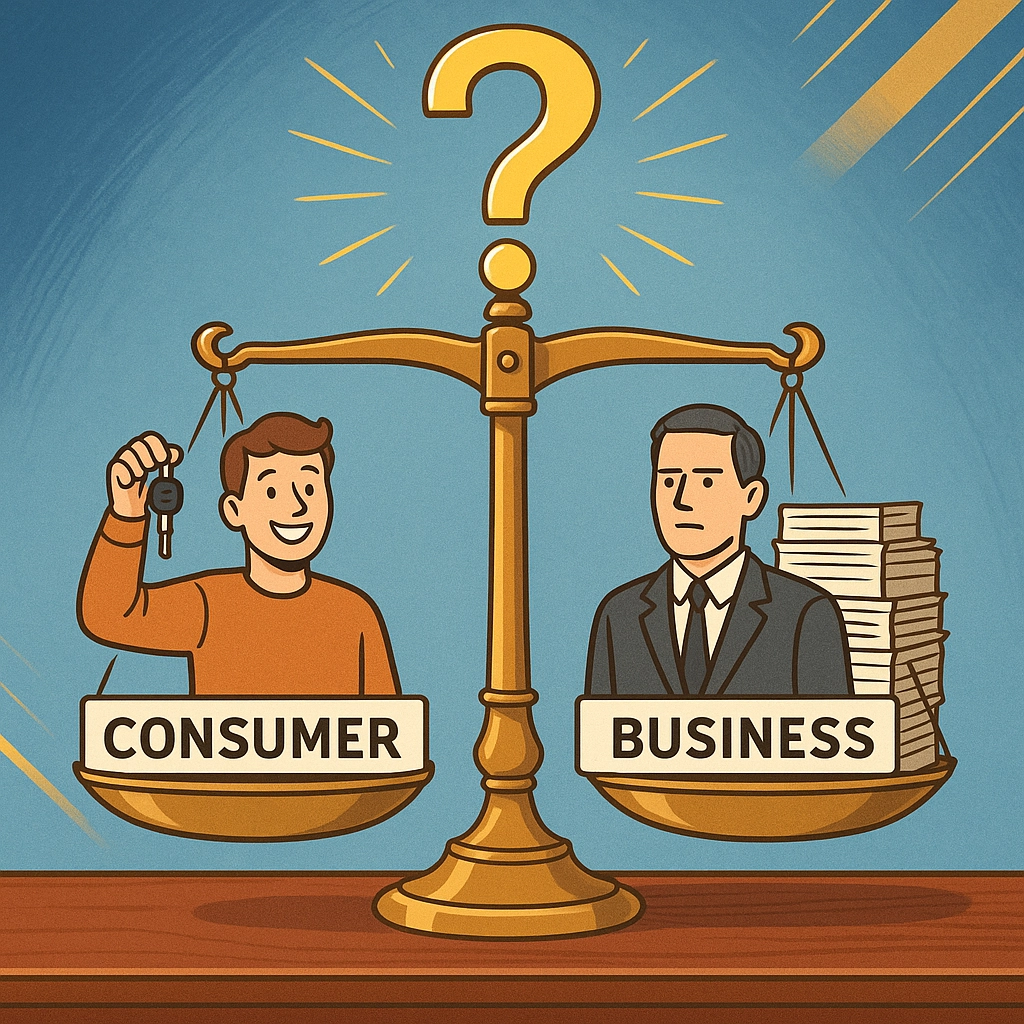What Is Negative Equity in Car Buying?
If you’ve ever bought a car while still owing money on your previous vehicle, chances are you’ve heard phrases like “negative equity” or being “upside-down” on your loan. But what does that actually mean, and why does it matter in a California Lemon Law case?
Negative equity happens when you owe more on your car loan than the car’s current market value. Let’s put it in plain terms:
- You owe $20,000 on your car loan
- The car is only worth $15,000 if you trade it in
That $5,000 gap is your negative equity.
This often happens when you trade in a vehicle you still owe money on and roll that balance into a new car’s financing. The old loan joins the new one, making your starting balance much higher.

A simple diagram showing a car’s value versus the loan balance.
How Lemon Law Buybacks Usually Work
California’s Lemon Law exists to protect consumers stuck with cars that just won’t stop having problems. If your new vehicle has significant defects that can’t be repaired, the manufacturer may have to buy it back and refund what you’ve paid.
Here’s what lemon law compensation typically includes:
- Your down payment
- Monthly car payments you’ve made
- Registration, taxes, and official fees
- Payoff of your remaining loan balance
- Incidentals
- Attorney Fees and Costs
But it gets tricky when you have negative equity—especially if it was rolled over from a previous vehicle.
The Negative Equity Dilemma: Who Covers That Debt?
When car buyers roll negative equity into a new car loan, then get rid of that car (for example, under Lemon Law), the following happens:
- The buyback process determines how much the manufacturer is supposed to pay you.
- Some expect the manufacturer to pay off everything owed on the car—including the negative equity from your trade-in.
- In reality, manufacturers often exclude negative equity from the buyback calculation or argue it should be deducted.
This means, with a lemon buyback, you might find yourself still owing thousands of dollars in negative equity—money that has nothing to do with the new lemon car, but everything to do with your prior trade-ins and loans.

A sad face next to a car and a pile of “debt” receipts showing what’s left over after a buyback.
What Does California Law Say About Negative Equity in Lemon Cases?
This is where things get foggy, even for legal experts.
- Consumer perspective: Negative equity was part of the “price paid or payable”—it’s the amount you actually financed and are on the hook for, so why shouldn’t it be reimbursed?
- Manufacturer’s view: They shouldn’t be responsible for clearing debts from your previous vehicle—you’re only entitled to what the lemon car itself is worth, plus your actual out-of-pocket costs for it.
The California legislature passed new law this year (2025) that says the manufacturer gets to deduct for the negative equity in lemon law buybacks.

A scale balancing “consumer rights” versus “manufacturer interests” with a question mark overhead.
Why Negative Equity Surprises So Many Lemon Law Clients
Let’s walk through a common scenario:
- You’re fed up with your defective car and file a lemon law claim.
- Months later, you’re offered a buyback.
- You receive the settlement paperwork—and your jaw drops. The manufacturer is not offering to pay the full (high) balance you owe on your loan!
- You realize the excluded portion is the negative equity from your last car that got rolled into this one.
Suddenly, your “reimbursement” feels a lot less.
Bottom Line: Always know your negative equity position before purchasing a new vehicle and before pursuing a lemon law case.
Tips to Protect Yourself from Negative Equity Pitfalls
1. Check Your Loan Payoff Versus Your Vehicle’s Value
Use reliable online valuation tools or consult with your lender to get a clear picture. Know what’s left from any previous trade-ins that’s still on your loan.
2. Understand Your Paperwork
Before you sign a new car loan, look for wording about “amount financed,” “negative equity,” or trade-in balances. Know what debt is being rolled forward.
3. Be Upfront with Your Lemon Law Lawyer
Share every detail about your financing—including leftovers from prior cars. This helps your attorney strategize for the maximum recovery possible.
4. Ask for Calculations Early
When negotiating a lemon law settlement, specifically ask how negative equity is handled in their buyback offer. Get those numbers in writing!
5. Consider Expert Help
These cases can hinge on technicalities and negotiations. The team at the Law Offices of Sotera L. Anderson focuses on guiding California car owners through every twist and turn—including the negative equity issue. Read more about tips for a successful lemon law claim.

A checklist titled “Avoiding Lemon Law Surprises” with check marks next to each tip above.
FAQ: Negative Equity & California Lemon Law
Q: Does negative equity mean I can’t get any money back in a lemon law case?
A: Not at all! You’re still eligible for a buyback if your car qualifies as a lemon. The negative equity issue only affects how much is reimbursed and whether you’ll have leftover debt after the buyback.
Q: Should I never roll over negative equity when buying another car?
A: If you can avoid it, that’s safest. Rolling over old debt means you’re always playing catch-up… and it can cause problems if the new car turns out to be a lemon.
Q: Can my lemon law attorney force the manufacturer to pay negative equity too?
A: Sometimes—but not always. It depends on negotiations and the history of problems.
Q: How do I know if my situation is complicated by negative equity?
A: If you owed more than your previous car was worth when you traded it in, and that extra balance became part of your new loan, you probably have negative equity. Check your original paperwork or ask your lender for a breakdown.
The Takeaway for California Car Owners
Dealing with a lemon is stressful enough—don’t let negative equity add insult to injury. By understanding how rolled-over debt can impact your buyback, asking smart questions, and working with experienced counsel, you can avoid unpleasant financial surprises.
If you’re unsure about negative equity or want personalized advice about your rights under California’s changing lemon law landscape, reach out to the friendly team at the Law Offices of Sotera L. Anderson. We’re advocates for consumers, and we’ll help you steer clear of unnecessary pitfalls.

A person happily consulting with an attorney, symbolizing proactive legal help.
Need help with a lemon law claim or confused about negative equity? Browse our site for in-depth guides, or contact us for a free evaluation: Law Offices of Sotera L. Anderson.
 Call Us Now
Call Us Now Text Us Now
Text Us Now
 (855) 965 3666
(855) 965 3666

